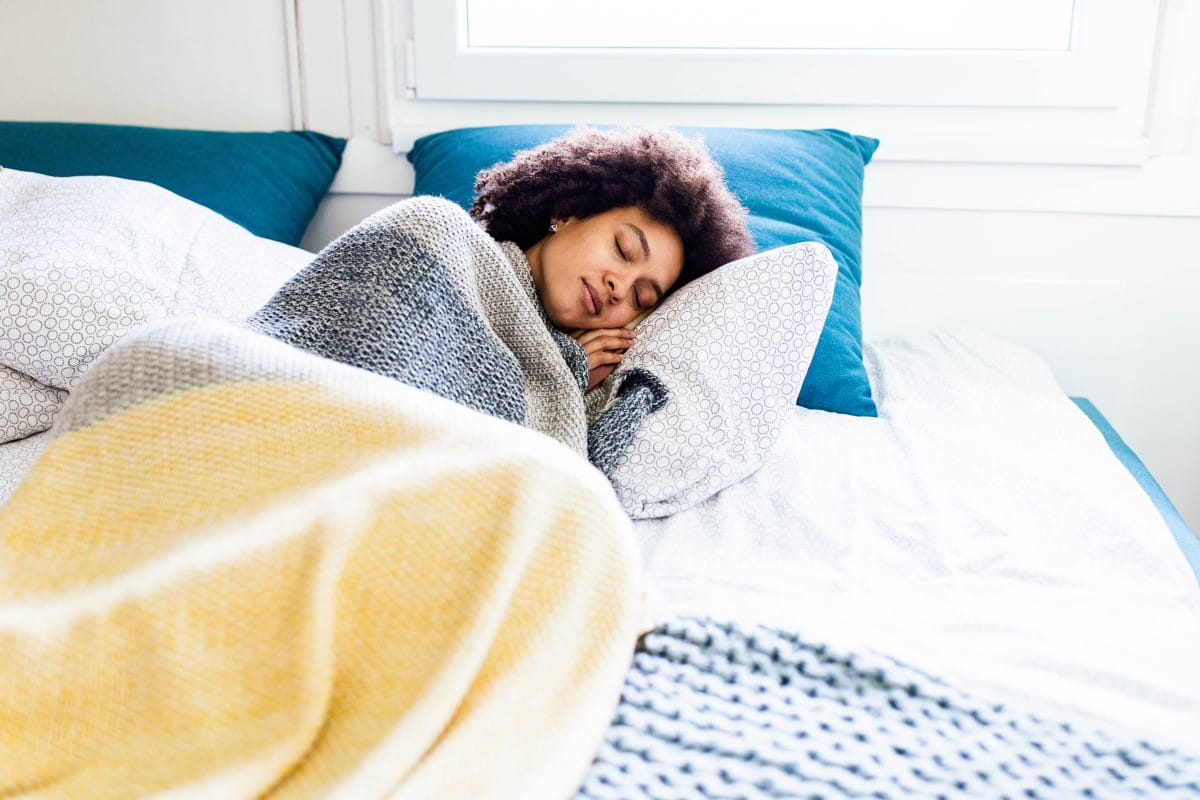“The research shows us that when people don’t have adequate amounts of sleep, there are associated relationships with increased risk of depression and anxiety.”—Dr Moira Junge, psychologist.
Key points
- Lack of sleep affects us physically, emotionally and cognitively. Getting enough sleep is key to minimising the risk of depression, anxiety and some diseases.
- The Australian Unity Wellbeing Index found that a person’s wellbeing score increases with increasing hours of sleep.
- There are two groups who suffer the effects of a lack of sleep – those who need to prioritise sleep more and those who have a sleep disorder or condition. If you feel you fall into the second group, you should seek medical attention.
When life gets busy, sleep is often the first thing that slips down the list of priorities.
But sacrificing your bedtime can have a huge impact on your wellbeing—and those effects go way beyond how much coffee you need to power through the next day.
From increased weight gain and decreased productivity to the impact on cognitive function, mental health and relationships, insufficient shut-eye can have a significant effect on our lives.

How a lack of sleep affects us
“Sleep impacts us physically, emotionally and cognitively,” says psychologist Dr Moira Junge, a Sleep Health Foundation board member and co-host of the Sleep Talk podcast.
“The research shows us that when people don’t have adequate amounts of sleep, there are associated relationships with increased risk of depression and anxiety. There are also associations with some dementias, some cancers and obviously more accidents.”
Dr Chin-Moi Chow, Associate Professor of Sleep and Wellbeing at the University of Sydney, adds: “When people don’t get sufficient amounts of sleep they tend to have an increased appetite. This can lead to an increased risk of weight gain and a craving for calorie-dense foods. Not getting enough sleep affects your cognition, memory retention and ability to learn. You’ll also be more irritable and agitated during the day.”
And, if you’re feeling irritable, your relationships don’t go untouched, either.
With poor sleep, our brains go into survival mode. Our ability to deal with the things around us, our patience, and our ability to listen to people—all the things that are important for a relationship—are de-prioritised as we deal with the essentials, like eating, working and getting through the day. The more we’re in survival mode, the less we are in a condition where we can nurture good relationships.
This is why health experts are calling for sleep to move back up the ladder of priorities. “At the Sleep Foundation, our motto is that sleep is the third pillar of health, alongside diet and exercise. These are the three main things that impact our mental and physical health,” says Moira.
Chin-Moi agrees: “Sleep is central to wellbeing.”
The better you sleep, the better your wellbeing
In fact, the Australian Unity Wellbeing Index—a 20+ year study into the wellbeing and life satisfaction of Australians, created in partnership with Deakin University—shows a relationship between better sleep and better wellbeing. According to the Wellbeing Index, a person’s wellbeing score increases with increasing hours of sleep—that is, until a person has an average of 10 hours of sleep, at which point personal wellbeing falls below the normal range.
Even swapping one hour of Netflix each night for one more hour of sleep can make a positive difference to your wellbeing. The same report shows that people who only get six hours of sleep per night could increase their personal wellbeing score by 3.2 points by sleeping an extra hour. Personal wellbeing is also higher for people who sleep through the night or just wake up once, especially compared to those who wake up more than five times per night.
How does this affect day-to-day life? Chin-Moi gives the example of shift workers. “Shift workers tend to have disrupted sleep and also shorter duration of sleep, because they have to sleep during the daytime when there’s interference with noise, light and social activities. Long-term, they tend to suffer from constipation, weight gain and a lot of other conditions.”
Keeping your sleep health in check
“The good thing about sleep is that everyone knows what it feels like to sleep poorly and everyone knows how good it can feel when you sleep really well,” says Moira. “And not everyone has a sleep problem. The majority of people sleep well.”
According to the Australian Unity Wellbeing Index, 61 percent of Aussie adults get an average of seven to eight hours of sleep each night, while 31.2 percent get fewer than seven hours. The average hours of sleep per night associated with the highest wellbeing is nine hours.
If you feel like your wellbeing is suffering because of a lack of sleep, Moira says there are two possible cohorts you may fall into. “There are people who just need to prioritise sleep more and those who have a sleep disorder or condition,” she says.
For those in the first cohort, following sleep hygiene tips—such as switching off devices an hour before bed, keeping your bedroom cool and dark, and exercising during the day—could help you catch up on sleep and support your wellbeing. “If you’ve incurred a sleep debt, when a sleep opportunity is available you will sleep deeper, with more slow-wave sleep as well as rapid eye movement (REM) sleep, so you do catch up. This is generally the case for most people,” says Chin-Moi.
“However, if a person suffers from a condition, for example, some sort of pathology due to medical illness, or if a person has chronic insomnia, they can be chronically deprived of sleep. Under these circumstances, these people can develop depression or the other conditions, such as diabetes or cardiovascular diseases.”
That’s when it’s important to seek medical advice. Moira suggests your GP is a good place to start, who can then refer you on to a psychologist or sleep physician for one-on-one coaching if needed. She also recommends checking the Sleep Services Directory by the Australian Sleep Association for experts in your area.
Whatever way you decide to tackle your sleep health, “don’t leave it untreated”, as Moira says. It could be the key to supercharging your wellbeing.
Disclaimer: Information provided in this article is of a general nature. Australian Unity accepts no responsibility for the accuracy of any of the opinions, advice, representations or information contained in this publication. Readers should rely on their own advice and enquiries in making decisions affecting their own health, wellbeing or interest. Interviewee titles and employer are cited as at the time of interview and may have changed since publication.


